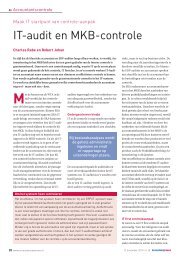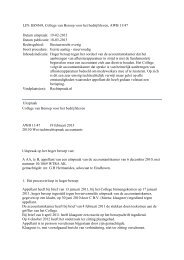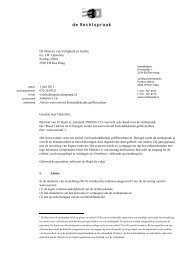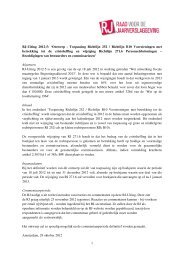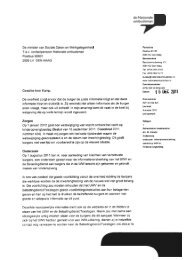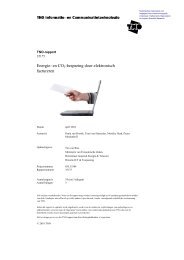Appetite for change - Accountancy Nieuws
Appetite for change - Accountancy Nieuws
Appetite for change - Accountancy Nieuws
You also want an ePaper? Increase the reach of your titles
YUMPU automatically turns print PDFs into web optimized ePapers that Google loves.
Section 3Where are the opportunities <strong>for</strong> government?To be meaningful, the targets need to be sufficientlyambitious, and backed by legally binding frameworks,which may include regulations, taxes and emissions tradingschemes. UK law, <strong>for</strong> example, mandates emissions of 34per cent below 1990 levels by 2020, and the government hasoffered to raise the target as part of a global agreement. Notsurprisingly, only six per cent of UK business leaders (thesecond lowest percentage worldwide), expect climate <strong>change</strong>will not affect them in the next few years. To be effective,national targets also need a monitoring and verificationregime, which has been proposed in the Copenhagen Accord.The absence of legal clarity, on the other hand, discouragesinvestment in <strong>change</strong>. Like the US Congress, the AustralianParliament is debating legislation to curb greenhouse gasemissions, and the outcome is still uncertain. Seventy percent of US and Australian businesses are not confident aboutlong-term investments as a response to current environmentalpolicies. It is also very difficult <strong>for</strong> US companies to predicthow much carbon abatement is going to make economicsense, with no clarity on the path of carbon prices. Even inthe UK, long-term confidence is low. Only in China and Indiado large majorities of business leaders feel confident (see fig.14 on page 23).To create a long-term investment strategy, companies must<strong>for</strong>ecast both likely policies and their outcomes. In the case ofclimate <strong>change</strong>, a critical outcome is the price of carbon fiveor ten years in the future. This would be difficult to predict <strong>for</strong>any mature, consistently-regulated commodity or pollutant.Carbon is neither.Carbon taxes, emissions trading schemes and incentiveshave widespread support in the business community.There is a surprising abundance of carbon tax supporters.Sixty four per cent of businesses endorse the idea. BartKuper, Tax Director of TNT Holding B.V., believes: “If we allthink we’re going to win the game by giving incentives topeople who behave well, instead of levying a tax <strong>for</strong> thosewho pollute, then we are a long way from home. If we only dothis by sending out carrots and not using sticks, we will runout of carrots.”Many environmental taxes are currently too low to be material,and only 13 per cent of businesses report paying a carbontax. In the European Union, <strong>for</strong> example, environmental taxesaccount <strong>for</strong> about one sixteenth of tax revenues, and overallrevenues from environmental taxes declined between 1999and 2007. 8 “None [of the environmental taxes] makes adifference because they are so fragmented,” according to anexecutive in the Netherlands, “They’re not even on our radar.”“If we all think we’re going to win the game by givingincentives to people who behave well, instead oflevying a tax <strong>for</strong> those who pollute, then we are a longway from home. If we only do this by sending outcarrots and not using sticks, we will run out of carrots”Bart KuperTax Director, TNT Holding B.V.8European Commission, “Taxation Trends in the European Union: Main results” 2009 edition.16 <strong>Appetite</strong> <strong>for</strong> <strong>change</strong>. PricewaterhouseCoopers.



